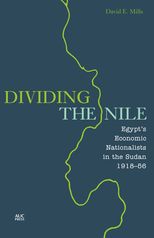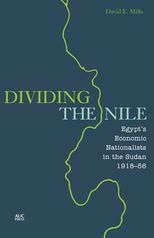Dividing the Nile: Egypt's Economic Nationalists in the Sudan 1918-56
Dividing the Nile: Egypt's Economic Nationalists in the Sudan 1918-56
Professor of Middle East history
Cite
Abstract
Dividing the Nile offers a new perspective on Anglo-Egyptian rule in the Sudan. Most scholarship has attributed Sudanese independence in 1956 to British dominance of the Condominium, historical animosity toward Egypt, or the emergence of Sudanese nationalism. Dividing the Nile counters that Egyptian entrepreneurs failed to develop a united economy or shared economic interests, guaranteeing Egypt's ‘loss’ of the Sudan. It argues that British dominance of the Condominium may have stymied initial Egyptian efforts, but that after the First World War Egypt became increasingly interested in and capable of economic ventures in the Sudan. However, early Egyptian financial assistance and the seemingly successful resolution of Nile water resources by the latter 1920s had actually divided the regions. With the signing of the 1936 Anglo-Egyptian Treaty and the easing of Depression-era conditions, Egyptians finally began concerted efforts to promote commerce and to acquire Sudanese lands. Egyptian entrepreneurs were never able to overcome British officials’ opposition to irrigated agricultural schemes in the Sudan, and merchants made inroads only in very limited local markets and only when international competitors were temporarily restricted. Solid Sudanese economic bonds to global markets that had been established in the first forty years of the Condominium administration could not be undone in its last decade and a half of existence. Egyptian nationalists had simply missed opportunities of aligning their economic future with that of their Sudanese brethren, resulting ultimately in two independent nations.
-
Front Matter
- Introduction
-
1
The ‘Natural’ Unity of the Nile Valley
-
2
‘Successful’ Division of Water Resources
-
3
Agreement, Institutions, and Opportunities, 1936–39
-
4
A Valley Divided: Transportation Difficulties
-
5
Disguised Exploitation: Agricultural and Industrial Designs on the Sudan
-
6
An Expanded Sudanese Market? Egyptian Exports to the Sudan
-
7
An Economic Lifeline? Egyptian Reliance on Sudanese Imports
- Conclusion
-
End Matter
Sign in
Personal account
- Sign in with email/username & password
- Get email alerts
- Save searches
- Purchase content
- Activate your purchase/trial code
Institutional access
-
Sign in through your institution
- Sign in with a library card Sign in with username/password Recommend to your librarian
Institutional account management
Sign in as administratorPurchase
Our books are available by subscription or purchase to libraries and institutions.
Purchasing information| Month: | Total Views: |
|---|---|
| October 2022 | 3 |
| April 2023 | 3 |
| April 2023 | 3 |
| April 2023 | 3 |
| April 2023 | 3 |
| April 2023 | 3 |
| April 2023 | 3 |
| April 2023 | 3 |
| April 2023 | 3 |
| April 2023 | 3 |
| April 2023 | 3 |
| April 2023 | 3 |
| April 2023 | 3 |
| April 2023 | 3 |
| April 2023 | 5 |
| April 2023 | 3 |
| April 2023 | 3 |
| April 2023 | 3 |
| July 2023 | 2 |
| July 2023 | 1 |
| July 2023 | 1 |
| July 2023 | 3 |
| July 2023 | 2 |
| July 2023 | 3 |
| July 2023 | 2 |
| July 2023 | 1 |
| July 2023 | 2 |
| July 2023 | 2 |
| July 2023 | 2 |
| July 2023 | 2 |
| July 2023 | 2 |
| August 2023 | 1 |
| February 2024 | 1 |
| February 2024 | 2 |
| February 2024 | 2 |
| February 2024 | 2 |
| February 2024 | 2 |
| February 2024 | 1 |
| February 2024 | 3 |
| February 2024 | 2 |
| February 2024 | 6 |
| February 2024 | 2 |
| February 2024 | 2 |
| February 2024 | 3 |
| February 2024 | 2 |
| February 2024 | 3 |
| February 2024 | 2 |
| February 2024 | 2 |
| February 2024 | 2 |




Get help with access
Institutional access
Access to content on Oxford Academic is often provided through institutional subscriptions and purchases. If you are a member of an institution with an active account, you may be able to access content in one of the following ways:
IP based access
Typically, access is provided across an institutional network to a range of IP addresses. This authentication occurs automatically, and it is not possible to sign out of an IP authenticated account.
Sign in through your institution
Choose this option to get remote access when outside your institution. Shibboleth/Open Athens technology is used to provide single sign-on between your institution’s website and Oxford Academic.
If your institution is not listed or you cannot sign in to your institution’s website, please contact your librarian or administrator.
Sign in with a library card
Enter your library card number to sign in. If you cannot sign in, please contact your librarian.
Society Members
Society member access to a journal is achieved in one of the following ways:
Sign in through society site
Many societies offer single sign-on between the society website and Oxford Academic. If you see ‘Sign in through society site’ in the sign in pane within a journal:
If you do not have a society account or have forgotten your username or password, please contact your society.
Sign in using a personal account
Some societies use Oxford Academic personal accounts to provide access to their members. See below.
Personal account
A personal account can be used to get email alerts, save searches, purchase content, and activate subscriptions.
Some societies use Oxford Academic personal accounts to provide access to their members.
Viewing your signed in accounts
Click the account icon in the top right to:
Signed in but can't access content
Oxford Academic is home to a wide variety of products. The institutional subscription may not cover the content that you are trying to access. If you believe you should have access to that content, please contact your librarian.
Institutional account management
For librarians and administrators, your personal account also provides access to institutional account management. Here you will find options to view and activate subscriptions, manage institutional settings and access options, access usage statistics, and more.